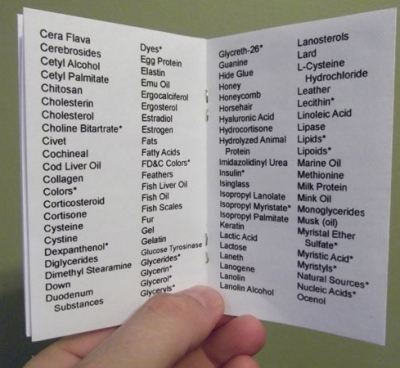VLV Articles
ANIMAL INGREDIENTS
As a new vegan it can be very daunting when you first realise that just about everything you used to consume has something to do with an animal product or an animal by-product. Just about everything you see on the supermarket shelves has leftover animal parts listed on the ingredients list. This is due to every part of the animals being slaughtered is used in other industries. One thing you can say for the animal murderers is that they do use every part of the animal, whether it’s actually needed in a product or not.
The main ingredients to look out for on your ingredients list are milk products including casein (milk protein) and lactose (milk sugar), egg products like albumen, gelatine (can be vegetable derived in some cases) and cochineal an red colouring made by crushing up beetles. Other ingredients include:
Ingredients Check List from the Vegan Society UK
Animal-derived additives
- E120 cochineal
- E542 edible bone phosphate
- E631 sodium 5'-inosinate
- E901 beeswax
- E904 shellac
- calcium mesoinositol hexaphosphate
- lactose
- sperm oil
- spermaceti
Other Animal Products:
Animal fibres — angora, astrakhan, cashmere, mohair, wool
Animal milks and animal milk derivatives — casein, caseinates, lactates, lactic acid, lactose
Bee products — bee pollen, bee venom, beeswax, honey, propolis, royal jelly
Dairy products and by-products — butter, cheese, whey, yoghurt
Eggs — hen, quail, duck, ostrich
Human-derived substances — e.g. keratin, placenta
Items obtained direct from the slaughter of animals — fish (including anchovies), game and their derivatives (e.g. meat/fish extracts and stocks), poultry, meat
Marine animal products — ambergris, capiz, caviar(e), chitin, coral, fish scales, fishmeal, isinglass, marine oils and extracts (e.g. fish oils, shark oil (squalene or squalane), seal oil, whale oil), natural sponge, pearl, roe, seal meat, shellfish, sperm oil, spermaceti wax, whale meat
Miscellaneous - amniotic fluids, animal and fish glues, carmine/carminic acid, catgut, chamois, cochineal, crushed snails or insects, fixatives (e.g. musk, civet, castoreum) hormones (e.g. oestrogen, progesterone, testosterone) ivory, lanolin(e), oil of mink, parchment, placenta, silk, shellac, snake venom, some vitamins (e.g. D3), urea, vellum, and any carriers (Gelatine is sometimes used to carry beta-carotene and D ), processing aids (Lactose is often used to fix flavour in crisps), or 2 release agents (sometimes used to prevent confectionery and baked goods adhering to manufacturing equipment) containing/comprising substances of animal origin
Slaughter by-products — animal fats (e.g. dripping, lard, suet, tallow), amino acids, aspic, bone, bone charcoal, bone-meal, bristles, collagen, down, dried blood, fatty acid derivatives, feathers, fur, gelatin(e), glycerin(e)/glycerol, hair, hides (leather, suede etc), hoof & horn meal, oleic acid, oleoic oil, oleostearin, pepsin, proteins (e.g. elastin, keratin, reticulin), rennet, skins, stearates, stearic acid, stearin(e)
Possibly animal-derived additives
- E101 riboflavin, lactoflavin, vitamin B2
- E101(a) riboflavin 5'-phosphate
- E153 (believed animal-free version only may be used in food) carbon black, vegetable carbon
- E16(b) lutein
- E161(g) canthaxanthin
- E236 formic acid
- E237 sodium formate
- E238 calcium formate
- E270 lactic acid
- E322 lecithin
- E325 sodium lactate
- E326 potassium lactate
- E327 calcium lactate
- E422 glycerol (glycerine)
- E430 (believed to be no longer permitted in food) polyoxyethylene (8) stearate, polyoxyl (8) stearate
- E431 polyoxyethylene (40) stearate, polyoxyl (40) stearate
- E432 polyoxyethylene sorbitan monolaurate, polysorbate 20
- E433 polyoxyethylene sorbitan mono-oleate, polysorbate 80
- E434 polyoxyethylene sorbitan monopalmitate, polysorbate 40
- E435 polyoxyethylene sorbitan monostearate, polysorbate 60
- E436 polyoxyethylene sorbitan tristearate, polysorbate 65
- E470(a) sodium, potassium and calcium salts of fatty acids
- E470(b) magnesium salts of fatty acids
- E471 glycerides of fatty acids, glyceryl monostearate, glyceryl distearate
- E472(a) acetic acid esters of glycerides of fatty acids, acetoglycerides, glycerol esters
- E472(b) lactic acid esters of glycerides of fatty acids, lactylated glycerides, lactoglycerides
- E472(c) citric acid esters of glycerides of fatty acids
- E472(d) tartaric acid esters of glycerides of fatty acids
- E472(e) mono and diacetyltartaric acid esters of glycerides of fatty acids
- E472(f) mixed acetic and tartaric acid esters of mono- and diglycerides of fatty acids
- E473 sucrose esters of fatty acids
- E474 sucroglycerides
- E475 polyglycerol esters of fatty acids
- E476 polyglycerol esters of polycondensed fatty acids of castor oil, polyglycerol polyricinoleate; polyglycerol esters of dimerized fatty acids of soya bean oil
- E477 propylene glycol esters of fatty acids; propane-1,2-diol esters of fatty acids
- E478 lactylated fatty acid esters of glycerol and propane-1,2-diol
- E479(b) thermally oxidized soya bean oil interacted with mono and di-glycerides of fatty acids
- E481 sodium stearoyl-2-lactylate
- E482 calcium stearoyl-2-lactylate
- E483 stearyl tartrate
- E491 sorbitan monostearate
- E492 sorbitan tristearate, span 65
- E493 sorbitan monolaurate, span 20
- E494 sorbitan mono-oleate, span 80
- E495 sorbitan monopalmitate, span 40
- E570 fatty acids (including myristic, stearic, palmitic and oleic), butyl stearate
- E572 magnesium salts of fatty acids (including magnesium stearate); calcium stearate
- E585 ferrous lactate
- E627 guanosine 5'-disodium phosphate, sodium guanylate, disodium guanylate
- E635 sodium 5'-ribonucleotide
- E640 glycine and its sodium salt
- E920 L-cysteine hydrochloride
- E1518 glyceryl mono-, di- and tri-acetate (triacetin)
- calcium hepatonate
- calcium phytate
- diacetin
- glyceryl
- leucine
- monoacetin
- oxystearin
Vegetable, mineral or plant synthetic forms of the above substances are acceptable, as are micro- biologically-fermented substances of plant origin.
I know that was a HUGE list - don't freak yourself out about it!
In the beginning you really don’t realise the extent of animal products and by-products that are in just about everything. Don’t get overwhelmed, do the best you can to educate yourself about the ingredients as well as the alternatives that are available. When I first became a vegan I bought an additives book that listed all of the numbers corresponding to additives, colourings, flavourings that were put into products. This book also listed the sources of each of the products and what affects certain numbers and ingredients could have.
Over time you will know what is vegan and what is not and you will get to know products and brands. The best thing to do is to educate yourself, research, ask opinions of people you respect and people who have been vegan for awhile. Be aware and you will be fine.
Leigh-Chantelle is an International Speaker & Consultant; Author, Singer/Songwriter and Blogger.
Latest Photos
 This work is licenced under a Creative Commons Attribution-NonCommercial-NoDerivs 3.0 Australia Licence
This work is licenced under a Creative Commons Attribution-NonCommercial-NoDerivs 3.0 Australia Licence

